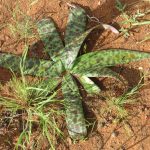Evolution of monocotyledonous geophytes with special focus on African Ledebouria and close relatives (Asparagaceae)
 Ledebouria is a group of approximately 54 flowering plant species in the Scilloideae (Asparagaceae). The taxonomic uncertainty that characterizes this group can be attributed to its large distribution (sub-Saharan Africa, Madagascar, and India) and the wide morphological variation found among the mostly poorly known species. So far, the majority of research on Ledebouria has focused on species from South Africa, with a few recent studies including taxa from Socotra and India. In order to fully understand this group’s evolutionary history, many more taxa from across the complete distribution of this group need to be included in studies. We are interested in investigating the evolution and historical biogeography of Ledebouria and determining the putative ancestral areas and routes of migration from and within Africa.
Ledebouria is a group of approximately 54 flowering plant species in the Scilloideae (Asparagaceae). The taxonomic uncertainty that characterizes this group can be attributed to its large distribution (sub-Saharan Africa, Madagascar, and India) and the wide morphological variation found among the mostly poorly known species. So far, the majority of research on Ledebouria has focused on species from South Africa, with a few recent studies including taxa from Socotra and India. In order to fully understand this group’s evolutionary history, many more taxa from across the complete distribution of this group need to be included in studies. We are interested in investigating the evolution and historical biogeography of Ledebouria and determining the putative ancestral areas and routes of migration from and within Africa.
We are also looking into possible scenarios as to why this group does not occur in the Mediterranean basin since some closely related taxa have the same distribution but can be found in Mediterranean climates. Ledebouria have been shown to be paraphyletic with Drimiopsis and Resnova but so far analyses have included only a few taxa. We are planning to increase sample sizes to further investigate the relationship between these taxa and their delimitation, hopefully resulting in the identification of clades supported by interesting morphological synapomorphies.
, C.C., , L., , N., , D., , A.R., , P., ,T.S., From southern Africa and beyond: historical biogeography of the Ledebouriinae (Scilloideae, Asparagaceae). Journal of Biogeography doi.org/10.1111/jbi.1462
Howard, C.C., Crowl, A.A., Harvey, T.S., Cellinese, N. 2022. Peeling Back the Layers: First Phylogenomic Insights into the Ledebouriinae (Scilloideae, Asparagaceae). Molecular Phylogenetics and Evolution, 169: 107430 doi.org/10.1016/j.ympev.2022.107430
Howard, C.C. and Cellinese, N. 2020. Tunicate bulb size in monocots explained by temperature and phenology. Ecology and Evolution. doi:10.1002/ece3.5996
Howard, C.C., Landis, J.B., Beaulieu, J.M., Cellinese, N. 2020. Geophytism in monocots leads to higher rates of diversification. New Phytologist 225: 1023-1032
Howard, C.C., Folk, R., Beaulieu, J.M., Cellinese, N. 2019. The monocotyledonous underground: global climatic and phylogenetic patterns of geophyte diversity. American Journal of Botany 106(6): 1–14.